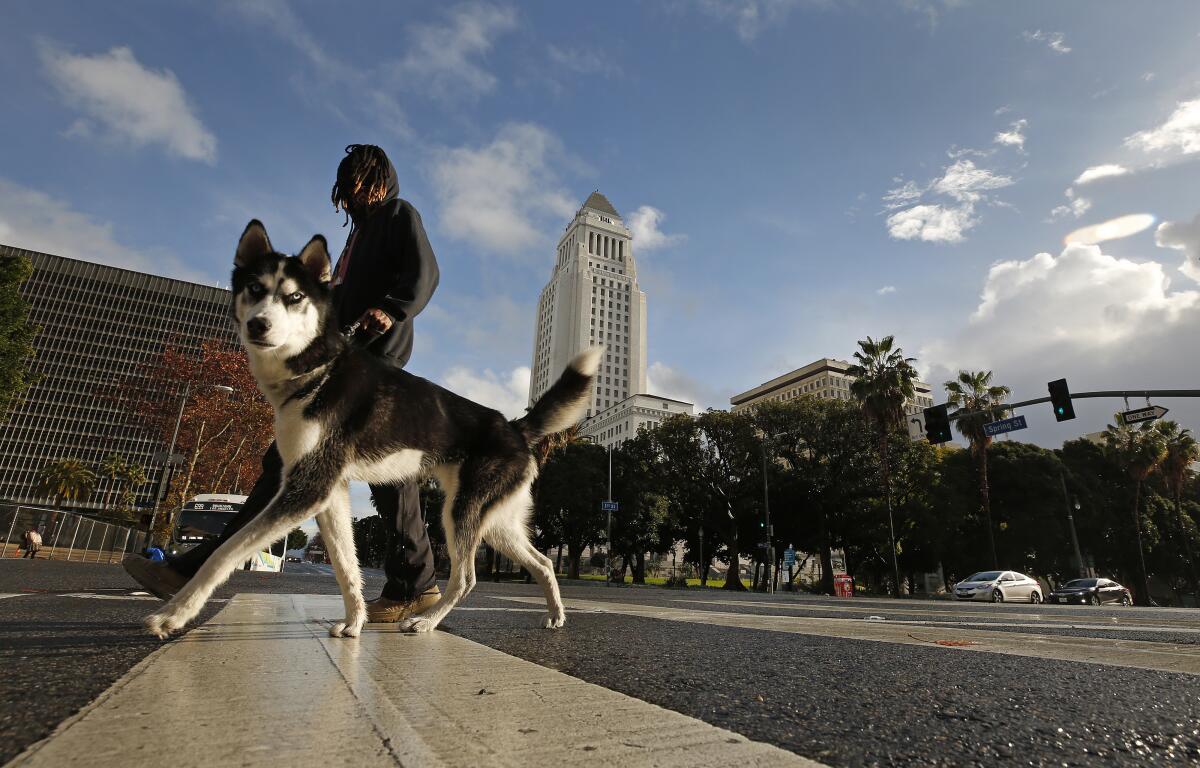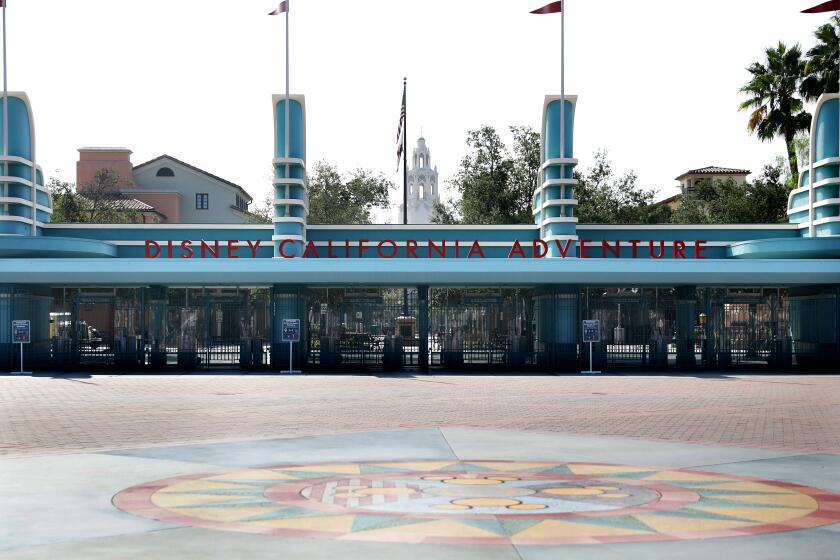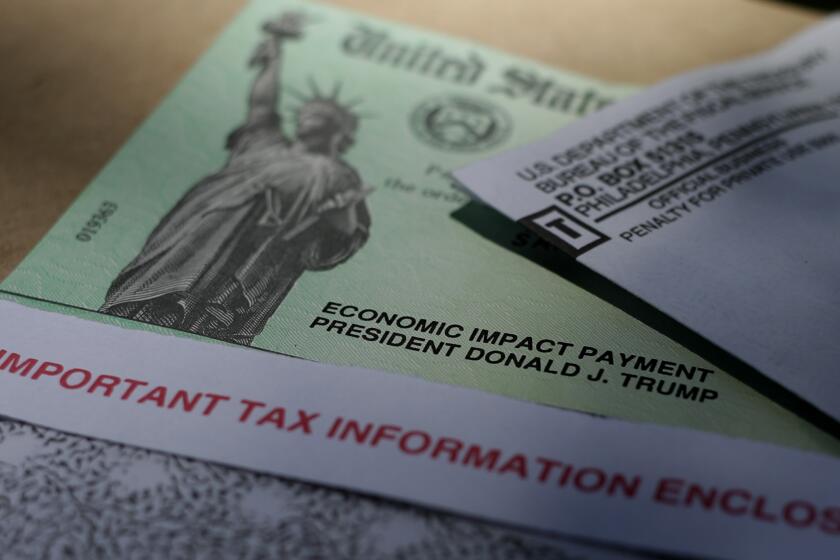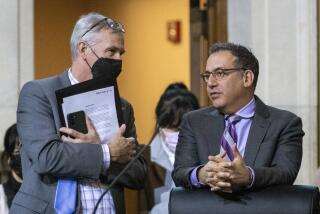L.A. expects to receive $1.35 billion from the relief bill. Garcetti is ‘ecstatic’

- Share via
L.A.’s political leaders have been buffeted by bad budget news since the outbreak of COVID-19 — business shutdowns, plummeting tax revenues, a hollowed-out tourism sector and a financial gap that has steadily grown to $750 million.
On Wednesday, Mayor Eric Garcetti and other city leaders received an unmistakably positive sign of a turnaround, with passage of a massive federal relief package that’s expected to send $1.35 billion directly to Los Angeles.
Garcetti said this week that he was “ecstatic” about the relief bill, predicting it will help the city cover coronavirus expenses, pay off key debts and rebuild government operations that were diminished during the pandemic.
“Now, with this money, we can put that money back into the savings account,” he said during his weekly COVID-19 briefing. “We can pay off the credit card. And any cuts we’ve made in critical services, we can restore.”
President Biden is expected to sign the relief bill Friday, freeing up $350 billion in aid for cities, counties and states hit by the loss of tax revenue caused by the COVID-19 pandemic and accompanying closures. California is in line to receive $42.6 billion, with $26 billion going to the state government.
Southern California is poised to reopen its economy more widely, but the pace will be uneven as some counties move forward more quickly than others.
The legislation is expected to provide $306 million to San Diego, $192 million to Oakland and $223 million to San Jose, according to one analysis of the bill. Los Angeles County is in line to receive more than $1.9 billion.
In Long Beach, which is expected to receive $153 million, Mayor Robert Garcia said he had already mapped out a plan for restoring city services, assisting small businesses and providing support for nonprofit organizations.
Garcia also intends to cancel furloughs for thousands of public employees and refill his city’s reserves, which helped pay for COVID-19 testing sites, vaccination centers and other public health needs over the past year.
“It was an emergency, and that’s what those reserves are for,” Garcia added. “We’re going to replenish those so we’re ready for the next emergency.”
For Los Angeles, the money is coming at an especially crucial moment.
To get through the crisis, Garcetti and the City Council persuaded city workers to take a handful of unpaid days off, drained a major portion of the city’s reserves and set the stage for “deficit borrowing” — taking out a $150-million loan to cover the cost of ongoing operations. They also had begun looking at pushing payment of certain bills into the next fiscal year, which starts July 1.
With passage of the bill, officials are hoping the $150-million loan will no longer be necessary.
U.S. Rep. Jimmy Gomez (D-Los Angeles) said the relief money will prevent city leaders from seeking additional pay cuts from their workers. Those reductions would have had a ripple effect across the region, hitting workers who are “the backbone of the middle class,” he said.
“Helping prevent those cuts keeps the dollars circulating, keeps them shopping and keeps them actually purchasing goods and services,” Gomez said.
More than $900 million in federal coronavirus relief federal funds has already flowed to the city over the past year. The city could still face some financial challenges if the region’s economic recovery proves to be slow, Garcetti said.
In a statement, City Controller Ron Galperin said Wednesday he expects taxes and other revenue to come up short for at least a few more months. The city should use its federal aid to restore its reserves and bring back programs that were casualties of the pandemic, he said.
“It should be our priority to ensure that neighborhood services families rely on don’t get cut or reduced,” Galperin said, “and to fully restore any that have suffered, especially in historically underserved communities.”
Nonprofit groups from South Los Angeles and other parts of the city offered a similar message, saying the vast majority of the federal money should go toward the neediest neighborhoods.
The $1.9-trillion COVID-19 relief bill will benefit Californians at local, state and federal levels. Here’s how it will affect you personally.
Community Coalition, InnerCity Struggle and other groups said they want a combined $500 million in federal funds to go toward child care, elder care and “housing security” initiatives — rent relief, mortgage relief and money to help residents pay their utility bills. Other portions of the money, they said, should go toward two years of guaranteed basic income — at least $1,500 a month — for families needing the most help.
“We understand that the city has a budget gap,” said Charisse Bremond Weaver, chief executive of the Brotherhood Crusade. “This is our opportunity not only to support the city budget gap, but really invest, like we have not invested in our communities ever before.”
Los Angeles City Councilman Paul Krekorian, who heads the powerful budget committee, offered a more cautious take, saying “no one should see this as ‘found money’ to be spent on new programs.”
“Our first priority must be to recover from the revenue losses that we have already suffered and will likely continue to suffer,” he said in a statement.
Los Angeles leaders could also face demands from city workers, who received pay cuts or provided other concessions, to give back now that the worst of the financial crisis appears over.
The Police Protective League, which represents rank-and-file LAPD officers, voted last month to delay two scheduled pay increases until 2023 as part of an effort to help the city cut costs. That agreement is now heading to the City Council for a final vote.
Under that agreement, the city’s negotiators promised to meet with the LAPD union in late July to discuss the possibility of restoring the two police raises ahead of schedule. However, if the city receives a “substantial amount” of federal funds in the interim, city negotiators must notify the police union immediately so that the two sides can meet and confer on the use of the money, according to the agreement.
On Wednesday, with the relief bill heading to Biden’s desk, the LAPD union’s board said it planned to work with city leaders collaboratively on ways of using federal funds to “reduce the increase in shootings and random violence plaguing our city.”
“We look forward to those discussions,” the union’s board said in its email to The Times.
Garcetti described the relief bill as one of the most progressive pieces of federal legislation since the Great Depression, providing money for rent relief, child care benefits and initiatives to combat homelessness. But he voiced doubts that the aid package would allow city workers to receive their raises on their original schedules.
The proceeds of the federal relief package must be used to rebuild the emergency reserves and pay off the debts that piled up as the city responding to the COVID-19 crisis, he said.
“That money has to go first and foremost to stabilizing our finances,” Garcetti added.
Times staff writer Sarah D. Wire contributed to this report.
More to Read
Sign up for Essential California
The most important California stories and recommendations in your inbox every morning.
You may occasionally receive promotional content from the Los Angeles Times.















